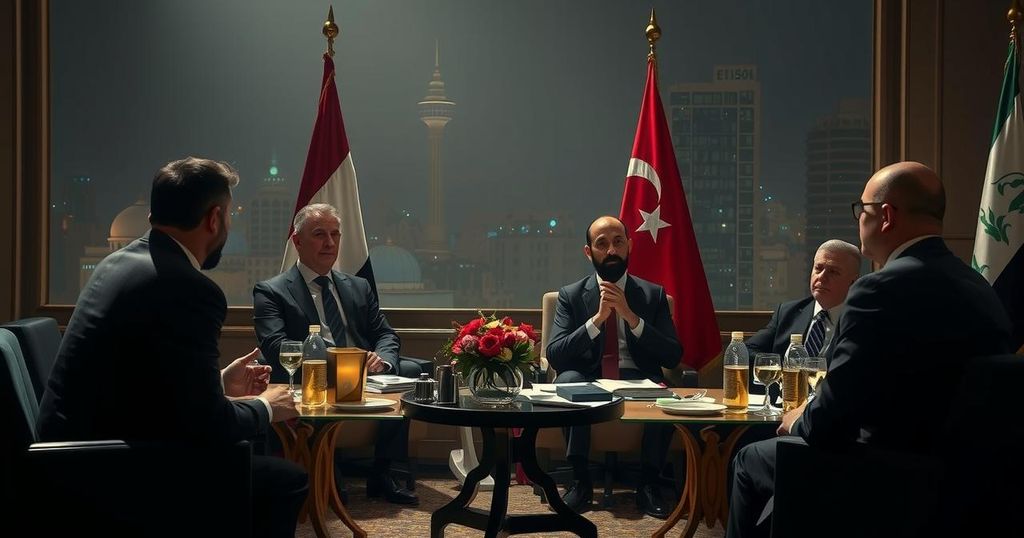Secretary of State Antony Blinken concluded a week of diplomatic discussions in London with UAE, Lebanon, and Jordan leaders. The talks focused on ending the Gaza conflict, securing humanitarian aid, and emphasizing diplomatic resolutions in Lebanon while addressing the roles of Hezbollah and Iran. Leaders stressed the urgent need for peace to prevent broader regional conflict.
Secretary of State Antony Blinken concluded an intensive week of diplomatic engagements in the Middle East with discussions in London involving key leaders from the United Arab Emirates, Lebanon, and Jordan on Friday. Among the dignitaries present were UAE Foreign Minister Sheikh Abdullah bin Zayed Al Nahyan, Lebanese Caretaker Prime Minister Najib Mikati, and Jordanian Deputy Prime Minister Ayman Safadi. During the meeting with Sheikh Abdullah, Blinken focused on strategies to “end the war in Gaza and secure the release of all hostages,” while also delving into plans for the “post-conflict period.” A statement from State Department Press Secretary Matthew Miller confirmed these discussions. Blinken expressed gratitude to the UAE for its continued humanitarian aid to Lebanon and Gaza. In his conversation with Prime Minister Mikati, Blinken reiterated the United States’ commitment to achieving a diplomatic resolution in Lebanon that aligns with United Nations Security Council Resolution 1701. The Secretary highlighted the importance of facilitating the return of displaced individuals on both sides of the Blue Line and expressed support for Lebanon’s governmental institutions. Blinken voiced his concern over civilian casualties and humanitarian suffering in the region, affirming America’s dedication to assisting vulnerable populations. He emphasized the detrimental role of Iran and Hezbollah in undermining Lebanon’s security and stability, and expressed support for the UN Interim Force’s essential role in keeping peace in the area. In his remarks regarding Jordan, Blinken recognized the nation’s critical partnership with the United States and its leadership in providing necessary support for the Palestinian people in Gaza. He stressed the urgency of the ongoing conversations aimed at concluding the conflict in Gaza and developing future pathways. Mikati and Safadi underscored the dire need for diplomatic resolutions in light of the catastrophic humanitarian situation in both Gaza and Lebanon. Mr. Safadi warned that the region stands at the brink of a broader conflict, insisting that Israel must cease aggressive actions towards Gaza and unilateral measures in the West Bank. He stated, “Nothing justifies the continuation of the wars. The guns have to go silent, diplomacy has to take precedence…” The conversations mark a significant step towards achieving stability and peace within the region, as all involved parties remain focused on the immediate humanitarian crises affecting civilians.
The article outlines Secretary of State Antony Blinken’s week-long diplomatic efforts in the Middle East, which culminated in discussions with leaders from the UAE, Lebanon, and Jordan. The talks centered on the critical issues of the Gaza conflict, the humanitarian crises influencing regional stability, and the importance of diplomatic resolutions to promote security. The backdrop of these discussions is defined by ongoing tensions in the region, specifically the conflict in Gaza, the political situation in Lebanon, and Jordan’s role in regional diplomacy. The emphasis on UN Security Council Resolution 1701 reflects a broader international framework that seeks to address border security and the return of displaced populations.
In conclusion, Secretary Blinken’s meetings reflect a concerted effort by the United States to foster diplomatic engagement in the Middle East amidst rising tensions and humanitarian crises. The discussions underline a collective commitment to achieving a ceasefire in Gaza, ensuring a return to stability in Lebanon, and addressing the urgent humanitarian needs of affected populations. The involvement of key regional leaders signifies a collaborative approach to resolving conflicts and establishing lasting peace.
Original Source: www.jpost.com






